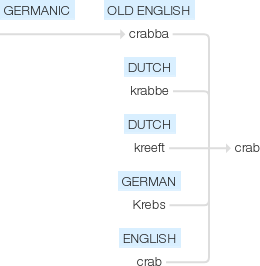Crab
Old English crabba, of Germanic origin; related to Dutch krabbe, and more distantly to Dutch kreeft and German Krebs ; also to crab3.
wiktionary
From Middle English crabbe, from Old English crabba(“crab; crayfish; cancer”), from Proto-West Germanic *krabbō, from Proto-Germanic *krabbô, from *krabbōną(“to creep, crawl”), from Proto-Indo-European *grobʰ-(“scratch, claw at”), a variant of *gerebʰ-. More at carve.
From Middle English crabbe(“wild apple”), of Germanic origin, plausibly from North Germanic, cognate with Swedish dialect scrabba.
Possibly a corruption of the genus name Carapa
From carabiner.
etymonline
crab (n.1)
popular name for a stalk-eyed, short-tailed, ten-legged crustacean, Old English crabba, from a general Germanic root (compare Dutch krab, Old High German krebiz, German Krabbe, Old Norse krabbi "crab"), related to Low German krabben, Dutch krabelen "to scratch, claw," from PIE root *gerbh- "to scratch, carve" (see carve). French crabe (13c.) is from Germanic, probably Old Norse.
The zodiac constellation name is attested in English from c. 1000; the Crab Nebula (1840), however, is in Taurus, the result of the supernova of 1054, and is so called for its shape. Crab stick "white fish meat dyed to resemble crab and pressed into a stick shape" is by mid-1950s. To catch a crab "fall or be thrown due to a mistake in rowing" is from 1785. The crab-louse (1540s), commonly found in pubic hair, is so called for its shape and appearance. Short form crab for this is from 1840; related: Crabs.
crab (n.2)
"fruit of the wild apple tree," a small and tart variety of apple, c. 1300 (mid-13c. in place-names), crabbe, perhaps from Scandinavian words (compare Swedish krabbäpple) which are of obscure origin. As "walking stick made of crab wood" by 1740. Crab-tree is from early 15c. Crab-apple for "fruit of the wild apple tree" is by 1712.
crab (v.)
c. 1400, "to vex, irritate," probably a back-formation from crabbed. The notions of "bad-tempered, combative" and "sour" in the two nouns crab naturally yielded a verb meaning of "to vex, irritate," later "to complain irritably, find fault" (c. 1500). As "to fish for crabs" from 1650s (implied in crabbing). The noun meaning "sour person" is from 1570s.
